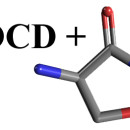OCD Core Fears Related to Body-Focused Obsessions & Compulsions (e.g., Swallowing, Breathing, Blinking)
This post is the second in a series of posts discussing body-focused obsessions and compulsions (aka, sensorimotor, somatosensory, or somatic obsessions and compulsions) in obsessive-compulsive disorder (OCD). This series was inspired by an original article written by Dr. David Keuler for Beyond OCD. You can access Dr. Keuler’s excellent article here. OCD Core Fears Related to Body-Focused Obsessions (also called Sensorimotor or Somatic Obsessions) In Part 1 of this series of posts, I discussed the basic characteristics of body-focused (also termed sensorimotor [Keuler, 2011], somatosensory, or somatic) OCD. This type of OCD is extremely distressing and is associated with hyperawareness of particular bodily processes, urges, or sensations. Obsessions and compulsions often focus on breathing, swallowing, tongue movements, blinking, or other bodily phenomena (Keuler, 2011). In clinical terminology, obsessive-compulsive disorder is a heterogeneous disorder. This means that different people have...
Read MoreSensorimotor OCD Body-Focused Obsessions & Compulsions (Swallowing, Breathing)
This post is the first in a series of posts discussing body-focused obsessions and compulsions (i.e., sensorimotor obsessions and compulsions) in obsessive-compulsive disorder (OCD). This series was inspired by an original article written by Dr. David Keuler for Beyond OCD. You can access Dr. Keuler’s excellent article here. Body-Focused Obsessions and Compulsions in OCD (sometimes called Sensorimotor, Somatosensory, or Somatic Obsessions/Compulsions) As I have mentioned previously, one particularly distressing symptom of obsessive-compulsive disorder (OCD) can be hyperawareness of particular bodily sensations. Body-focused obsessions (also called sensorimotor obsessions (Keuler, 2011) or somatosensory obsessions) often feel intolerable and typically involve getting your attention “stuck” on thinking about or analyzing particular autonomic processes. Thoughts may become fixated on one’s breathing rate, heart rate, swallowing, blinking, eye “floaters”, or flickering of the visual field (Keuler, 2011). Sufferers frequently label the problem as conscious...
Read MoreOCD Treatment (ERP & CBT): Exposure & Cognitive Restructuring
Question: To what extent would a change of mindset (e.g., changing my expectations for myself) be helpful in recovering from OCD? What is likely to happen if I delay formal treatment with a psychologist and work instead on changing my own mindset? OCD Treatment Components: Cognitive Restructuring + Exposures Regardless of whether or not it occurs in the context of formal psychotherapy, changing your mindset will be a critical component of your recovery. If you do any reading on cognitive behavioral therapy (CBT), you’ll see this referred to as “cognitive restructuring.” Devoting time to challenging and modifying your underlying belief system is essential for fighting OCD, but research on OCD indicates that this process alone will probably be insufficient if it’s not integrated with appropriate exposure-based behavioral strategies (e.g., exposure and response prevention [ERP]). OCD Treatment Delays In general,...
Read MoreOCD Treatment: OCD vs. Me. How do I Tell the Difference?
Question: Because many of my OCD rituals are related to my professional identity, I’m worried that changing my rituals will somehow change those parts of me that I like (e.g., my personal goals and ambitions). Should I be concerned about this? Early Onset OCD in Kids & Teens (Pediatric OCD) Many people worry that by fighting their OCD, they will lose essential parts of themselves. This is particularly true for adults with obsessive compulsive disorder, who have had to deal with OCD for most of their lives. Because OCD often begins early in childhood and can have a chronic course, it can be difficult to separate yourself from your OCD symptoms. In many pediatric OCD cases, kids with OCD exhibit symptoms by age 10. Shockingly, in certain cases, even toddlers can show clinical signs of obsessive-compulsive disorder. There are...
Read MorePure-O OCD Rituals: Starting Over, Resetting, & Undoing
Question: It’s hard to describe this, but I feel like every few days I need to mentally “start over” by doing a variety of mental and behavioral rituals. I don’t want to live like this, but I’m afraid that if I undergo treatment and stop my OCD rituals, I won’t be the same person with the same drives. Starting Over, Resetting, & Undoing Compulsions in OCD First, please rest assured that you’re not alone in experiencing these symptoms. Many people with OCD (“Pure-O” or otherwise) refer to them as “starting over” compulsions, “resetting” compulsions, or “undoing” compulsions, which serve the function of returning to a clean mental slate. Sometimes these compulsions consist of particular movements, self-statements, mental activities, or complex rituals with both behavioral and mental components. They are not as common as other types of rituals (e.g., washing,...
Read MoreOCD & D-cycloserine: A Promising Medication for OCD Treatment
As someone who has long been enamored with basic science, I find it fascinating when classic medications are re-purposed in surprising ways. One of the newest examples of this is the use of D-cycloserine (also known as Seromycin) in the treatment of obsessive-compulsive disorder (OCD). What’s interesting about D-cycloserine is not so much what it is…but what it isn’t: D-cycloserine is neither an SRRI nor any other type of antidepressant (e.g., Prozac). It’s not an anti-anxiety medication (e.g., Xanax, Klonopin). It’s not even an atypical antipsychotic (e.g., Abilify, Risperdal). If it’s not one of the above, then what is it? The answer might surprise you. Seromycin is actually an antibiotic that was originally developed to help fight off tuberculosis. What’s exciting about using an antibiotic to treat OCD is that it’s not subject to the same side effects as other medications (i.e., the SSRIs,...
Read More








